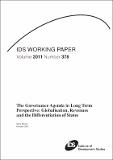The governance agenda in long term perspective : globalisation, revenues and the differentiation of states
Abstract
The governance-and-development agenda that has dominated thinking since the collapse of the Soviet Bloc is fast losing credibility. It continues to be associated with a set of countries,
ideas and experiences – the ‘West’ – that no longer enjoy global leadership. It has not
usefully identified the role of governments in promoting economic growth. And it takes little
account of the ways in which states are changing. The growing influence of the BRICs and
other emerging powers is now widely appreciated. This paper explores the ways in which
late twentieth century globalisation is bringing about more subtle changes in the political
constitutions of states that may have considerable implications for the ways in which we are
governed and the actions that may be needed to reduce the incidence of bad governance.
Contrary to widespread expectations, globalisation does not necessarily lead states to
become more like one another, or to converge around the ‘Western’ model of liberal
democracy and market capitalism. It also leads states to compete with one another. To the
extent that they compete by seeking alternative sources of revenue, this may lead them to
diverge politically. The concept of political revenues – the incomes that governments and
political elites obtain through the exercise of political power – is central to the analysis. One
of the consequences of late twentieth century globalisation is that, in some countries,
opportunities for political elites to gather (illicit) elite political revenues have expanded
considerably. This helps explain why fragile states have become a normal feature of the
global system. A more widespread consequence is that states enjoy a range of new non-tax
revenues in addition to ‘normal’ tax revenues. This has significant implications for the
accountability of governments to citizens.
Keywords: governance, state, globalisation, revenue, fragile state, drugs, oil.
Citation
Moore, M. (2011) The governance agenda in long term perspective : globalisation, revenues and the differentiation of states. Working paper series, 378. Brighton: IDS.Is part of series
IDS working papers;378Rights holder
Institute of Development StudiesCollections
- IDS Research [1671]

